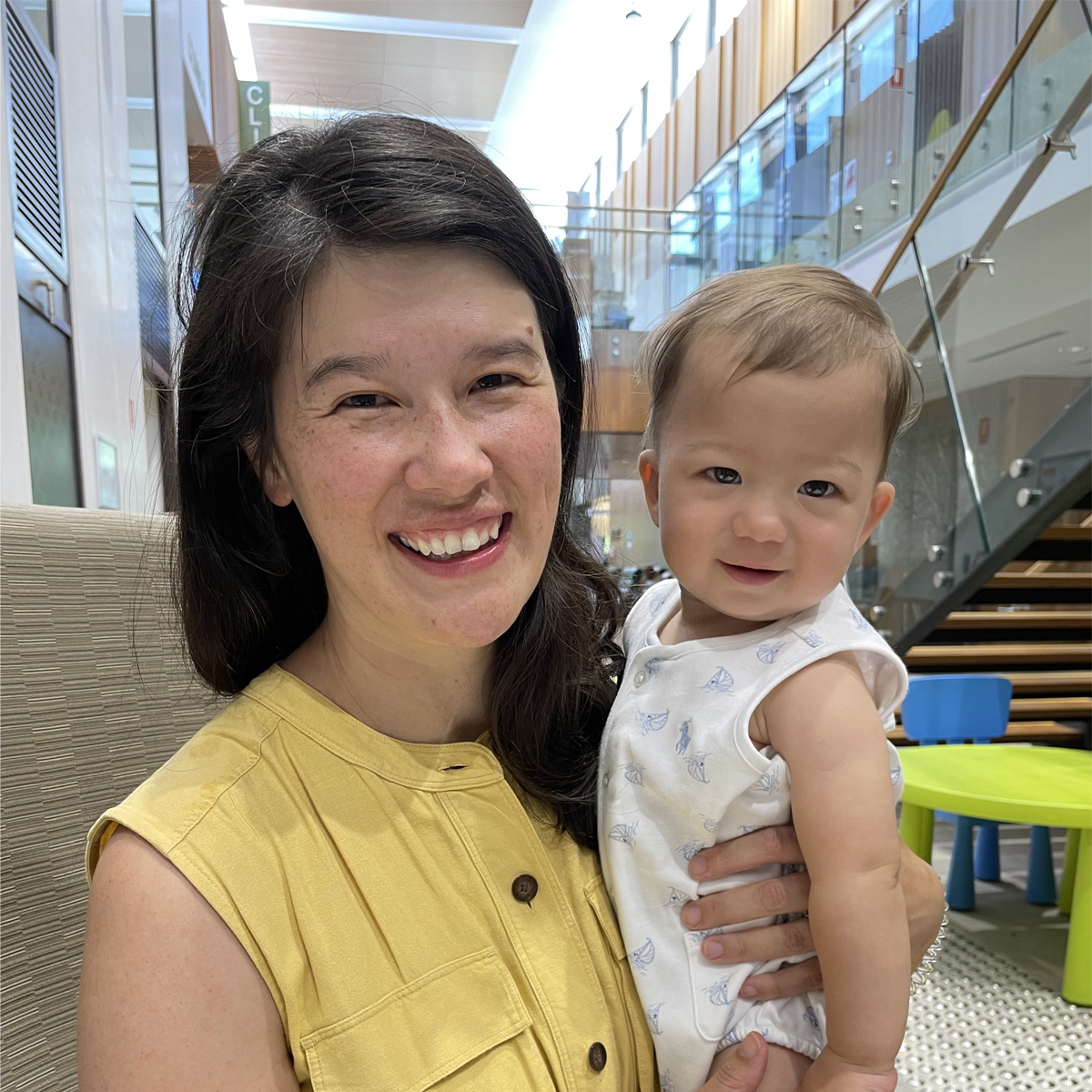Pictured above: Michelle McMullen and her baby, Noah Cronje
Medical oncologist, Michelle McMullen, often reaches a point with her cancer patients where she desperately wishes she had more options and better treatments to help them.
While there have been leaps and bounds in cancer treatments over the last few decades, there is still so much potential to achieve better outcomes for patients.
“The only way we can achieve this is through research”, shares Michelle.
Although Michelle supports the cancer patients who sit in front of her each day through her clinical practice, Michelle hopes to have an impact beyond the people she currently sees.
With the help of our donor-funded Collaborative Cancer Grant, Michelle is working with a team to develop new treatment options for breast cancer patients experiencing vaginal atrophy, as a side effect of their hormone blocking therapy.
“I believe it is part of my role and responsibility to contribute to help patients who come 10 or 20 years down the track – not just those who sit in front of me today”, she says.
The potential for better quality of life for my patients – through this research – is what keeps me inspired.
We sat down with Michelle to hear more about her exciting research project. Read on for the full interview.
What is the aim of your current research project?
“Me and my team are looking at developing new treatment options for breast cancer patients experiencing vaginal atrophy. Vaginal atrophy is a common side effect of hormone replacement therapy, which presents as stinging, burning, pain during urination, and difficulty having sex.”
Why is there a need for your research?
“My research project was inspired by a colleague who surveyed women with breast cancer in Western Australia and found that most of them wanted more treatments for vaginal atrophy.
Breast cancer is the most common cancer in women, and most women with early-stage breast cancer undergo a form of hormone therapy, aiming to lower systemic estrogen levels, for at least five years. This can push young women immediately into an early menopause-syndrome, and also for women that are already menopausal, that sudden and complete estrogen withdrawal can lead to vaginal atrophy.
So many women report that they don’t feel heard or are not able to find effective treatments. In the non-cancer world, the typical treatment we’d reach for to help with these symptoms is a topical estrogen cream, but for women with hormonally driven cancer, they’re understandably scared about using hormonally driven treatments. We wanted to find a solution.”
What is your current research project?
“Me and my team are comparing two non-hormone-based gel formulations with a placebo and seeing which of the two gels works better.
I hope to educate and distribute this information through GP networks and primary practice partners to make it easier for women to access non-hormonally based treatments.”
What are the next steps for your research?
“We are currently recruiting 56 women to be involved in this study. The study will run for three to six months, where we will randomise the use of the treatments and then look at which of the two formulations is more effective. We will run interviews to gauge some of the experiences of these women in their own words.
We are hoping to finish recruitment and treatments of patients in the study by the end of the year.”
Who will your research help?
“Vaginal atrophy is a common condition, and providing evidence to support different and potentially more effective treatments is going to affect the average West Australian breast cancer survivor who suffers from vaginal atrophy and doesn’t have a good treatment to reach for.”
Why are donations to cancer research so important?
“Donations to cancer research are so important because the sad fact of life is that almost one in two Australians will be diagnosed with cancer by the age of 85.
Until it happens to us, we always think it will happen to someone else.
Cancer affects all of us as we go through life, if not personally then through our family and loved ones. When that happens, we must make sure that they’re supported and that they have access to the best treatments and clinical trials here in WA. This can only happen through research funded by people like you.”
A word from Michelle to our donors
“For people in Western Australia who support Cancer Council WA, your money is well used – it’s cherished and taken care of. It has a real impact on the people that we walk with every day.
Everything starts somewhere. Every donation is building. We’re constantly building on our projects. Research leads you down a path which expands in an exponential way.”
You never know what your donation could lead to.
Tackling cancer takes all of us. As a community-funded organisation, together, we can support all West Australians impacted by cancer.
Find out more
- Donate to our cancer research projects
- Learn more about our funding opportunities
